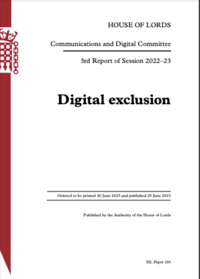Report finds Government has ‘no credible strategy’ for digital inclusion
A new report has found that the UK Government has “no credible strategy” to tackle digital exclusion, allowing “millions of citizens to fall behind.”
 The House of Lords Communications and Digital Committee, which is tasked with investigating public policy in media, digital, communications and creative industries, has published a report criticising the government's failure to put in place a plan to bridge the digital divide. This comes despite evidence that digital exclusion is exacerbating existing inequalities in society.
The House of Lords Communications and Digital Committee, which is tasked with investigating public policy in media, digital, communications and creative industries, has published a report criticising the government's failure to put in place a plan to bridge the digital divide. This comes despite evidence that digital exclusion is exacerbating existing inequalities in society.
The committee says the scale of the problem is a “direct consequence of political lethargy." It reveals that the flagship digital inclusion strategy is almost a decade old, formal cross-government evaluations have stopped and working groups have been disbanded.
The committee has called for the government to release an updated strategy within the next six months, which is pragmatic, proportionate and joined-up across government departments. The report recommends focusing on:
- Urgent action to help with the cost of living crisis, involving expanding discount schemes including social tariffs and vouchers already run by broadband providers and mandating that public service workers donate old devices to social inclusion projects
- Investment in basic skills including training the workforce in basic digital skills through both educational and community based projects
- Boosting digital inclusion hubs by increasing the reach of broadband services in rural areas and encouraging community centres and libraries to support people in upskilling themselves digitally
- Prioritising competition alongside local benefits by working to prevent larger providers from crowding out smaller businesses
- Future proofing public services by ensuring that already marginalised groups are not excluded from data gathering due to their lack of digital access
A moving target
As technologies continue to develop, the standards of digital inclusion are constantly changing; this presents government leaders with a moving target that requires constant, ongoing attention.
The UK is an increasingly digitalised society: monthly data usage has increased by 731% since the last strategy was published in 2014. Meanwhile, over 90% of jobs are reportedly now advertised exclusively online.
Despite this, the report highlights how 1.7 million households still do not have access to broadband, with people over 65 and from low socio-economic backgrounds being the least likely to use the internet at home. It is also estimated that one million people in the UK have also cut back on or cancelled their internet package this year due to the impact of the cost of living crisis.
Further concerns raised in the report related to the poor digital skillset of the UK population with 12% of adults failing the Lloyds Digital Skills for Life measure meaning they are not considered able to navigate the modern digital world alone. It is estimated that digital skills shortages cost the UK £63 billion every year.
Reality versus expectations
Chair of the Communications and Digital Committee, Baroness Tina Stowell of Beeston said: “The Government has bold ambitions to make the UK a technology superpower and centre of AI development, but we can’t deliver an exciting digital future when five million workers are under skilled in digital and nearly two and half million people still can’t complete a single basic digital task.”
She continued: “We have found a distinct lack of leadership in Government to tackle this issue. It is shocking that a digital inclusion strategy has not been produced since 2014 and the Government sees no need for a new one. It is vital we get a grip of this now.
“We need to ensure everyone and all age groups have the digital skills they need to operate and the opportunities to keep developing those skills as technologies change.”






